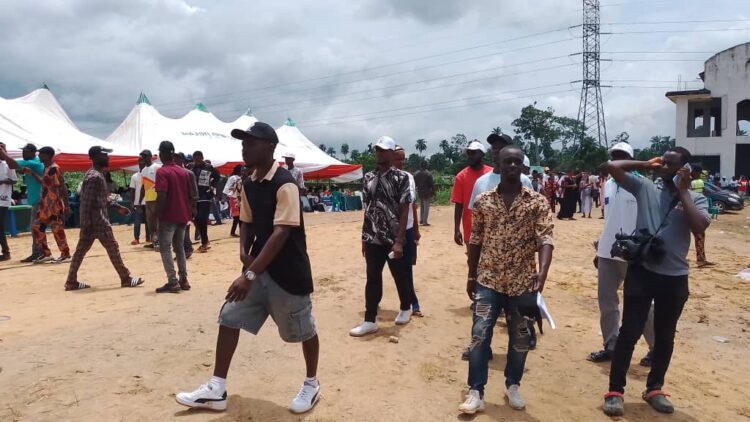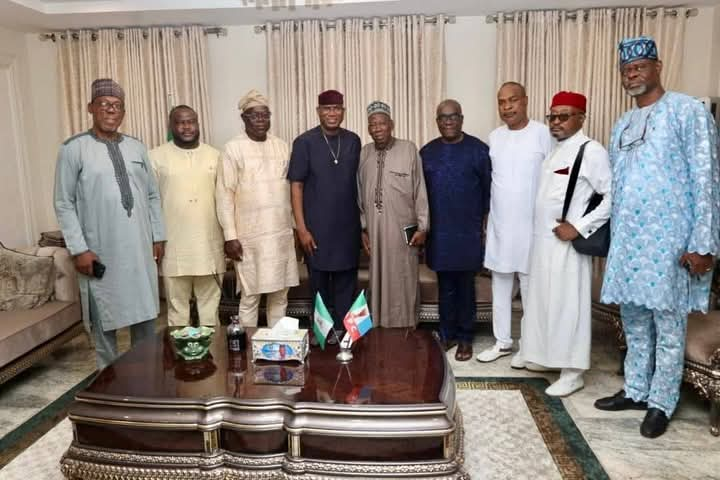By Sunny Awhefeada
Thirty years after the founding of the Delta State University, Abraka, stakeholders can look back and attempt a reckoning of her literary engagements. The harvest has been impressive and remarkably so. The seminal efforts that ran through the better part of two decades have started yielding dividends which manifest all around. The doyen, Sam Ukala went on to win Nigeria’s most prestigious literary prize and Africa’s biggest in monetary value the LNG Prize for Literature with Iredi War in 2014.
Abraka’s biggest poetry brand Ebi Yeibo won the prestigious Association of Nigerian Authors’(ANA) Prize for Poetry that same year with his highly acclaimed The Fourth Masquerade. It was double celebration for DELSU and the Department of English and Literary Studies organized a symposium to mark the achievement. That feat was not Yeibo’s first or last. He had in the year 2000 won the Oyo State ANA prize for poetry. Other notable prizes attesting to his poetic virtuosity include Delta State ANA Prize for Poetry (2003 and 2004), Bayelsa State ANA Prize for Poetry (2008), Isaac Boro Prize for Niger Delta Literature (2008) and quite significantly he won the maiden ANA Prize for Literary Criticism (2018).
He has also made the long list for the LNG Prize. Yeibo’s published collections include; Maiden Lines (1997), A Song for Tomorrow (2003), The Forbidden Tongue (2007), Shadows of the Setting Sun (2012), The Fourth Masquerade (2014), Of Waters and the Wild (2017), White Mask (2019). Yeibo’s contemporary in his undergraduate years, Alex Omoni has also published Morontonu (2006) and The Ugly Ones (2011).
It is apt to mention here that the writers coming out of Abraka find in the experience of the Niger Delta a rich mine for creative engagement. Besides the phenomenal presence of Yeibo in the articulation of that experience are other writers like Ekanpou Enewaridikeke, Emmanuel Esemedafe, Peter Omoko and Stephen Kekeghe. By far the most prolific, Enewaridikeke has published over ten collections straddling prose and poetry. Besides being shortlisted for the BBC International Playwriting Competition in 2003, he has won the Isidore Okpewho Prize for Prose in 2004 and was first runner-up for the Tanure Ojaide Poetry Prize the same year. His published works include: The Road to Ken Saro-Wiwa, Sandbank in River Forcados, The Honourable Commissioner (2005), The Lot Against My People (2005), The Chisel and the Pen (2005), The Imprisonment of Ebi in the Coven (2005), The Strong Blood (2005), The Raffia Palm Tree (2005), A Forest of Thorns (2005), A Forest of Animals (2005), Metamorphosis (2005), The Wanted Man in Camp Four (2012), Baida: A Family of Imbeciles (2012), You Must Leave Ekameta Tomorrow (2012), King Maika (2012), etc.
Omoko whose artistic sensibilities are conditioned by folklore, history and contemporary incidents has published six plays and three poetry collections; Battles of Pleasure (2009), Three Plays (2010), Uloho (2013), Crude Nightmen (2015), Majestic Revolt (2016), Herding South (2019), River Song and Testament (2020), A Requiem for the Gods (2020) and The Mudskippers (2021). His arduous application of the intellect to the creative enterprise has earned him honourable mention in the LNG Prize as well as being first runner-up in the 2021 ANA Prize for Drama. Kekeghe has also earned plaudits for his profoundly inspiring poetry and play.
The playwright and poet of Pond of Leeches (2015) and Rumbling Sky (2020) respectively won the 2021 ANA Poetry Prize. This feat not only marks the affirmation of the coming of age of the works of writers from the Abraka axis, but serves as an attestation to the artistic validity of these works in themes and techniques in their attempt to configure the Nigerian experience.
Emmanuel Esemedafe who seems to have anchored his creative impetus on prose has published three narratives with two of them located in children’s literature. His titles range from NYSC at Abugi (2009), The Schooldays of Edore (2013) and The Fly Book (2019). He was shortlisted for the LNG Prize with the second work.
The recrudescence of Nigerian literature at the turn of the century also accelerated the evolution of the Abraka artistic enterprise. Some of the younger lecturers, this writer and Dr. Enajite Ojaruega, as well as the Diaspora scholars earlier mentioned, from around 2005 began to populate the students’ reading list with the works of new writers like Chimamanda Ngozi Adichie, Sefi Atta, Kaine Agary, Helon Habila, Ogaga Ifowodo, Lola Shoneyin, Tade Ipadeola, Jumoke Verrisimo, Obari Gomba, Chika Unigwe, Igoni Barret, Eghosa Imasuen and many others. What confronted the students were lived experiences depicting contemporary realities.
Reading and evaluating what they encounter in real life in novels, plays and poems instilled in the students the confidence that they can also convert their lived experience into literary works. They wasted no time in doing that. The Creative Writers’ Workshop held readings after readings and even initiated literary prizes for the three genres of poetry, prose and drama.
The rejigging of the content of the stylistic course by Professor Macaulay Mowarin and Dr. Richard Maledo also enhanced the students’ creative and critical gusto in their engagement with artistry. Stylistics was no longer a bogeyman’s tool of mental affliction, but a course which mediates the link between language and literature. Mowarin and Maledo demystified Stylistics and made it a tool of literary engagement that it really was meant to be.
Some of the younger lecturers such as Aghogho Agbamu, Mathias Orhero and Prince Ohwavborua have had to intervene in making sure that the Workshop continues to run. New buds are evolving in Edafe Phyllis Oghenerioborue, Karo Enajemo, Godspower Oburumu, Favour Nwanne, Daniel Ojomi, Prosper Ifeanyi, Fortune Aganbi, Emmanuel Olugua, Elizabeth Eke, Emoghene Oghentega and Tejiri Egheneji. For two years running, the Department of Theater Arts under the headship of Chukwuma Anyanwu has stoked the embers of the pleasure of stage plays on campus. Anyanwu, Ibagere, Godfrey Enita and the choreographer Awele Odunze have lit up the stage with performances that make theatre goers ask for more. An added boost to this theatre awakening is the interest the Vice Chancellor, Professor Andy Egwunyenga and his wife Professor Ebele Egwunyenga have for the stage. They are a theatre-going couple. Their patronage of the theatre gave the stage a boost.
The Abraka School of Literature is evolving and there are strong indications that it will emerge with a distinct character which, while focusing on national cum global issues, reframes the experience of the Niger Delta locale as its motif. Another emergent feature of it is its cosmopolitan outlook arising from the diverse background of the lecturers. Besides the noticeable Ibadan influence are also strands from Calabar, Nsukka, Maiduguri, Benin and Port-Harcourt represented by Professor Simon Umukoro, Ojaruega, Karoh Ativie, Karo Ilolo, Anthonia Eguvbebere, Susan Ilechukwu and Ogochukwu Anigala.
The literary offerings of Abraka to the world have been variegated and rank high in aesthetics and functionality. Works from Abraka have found new outlets in anthologies and online media.
The literature is pulsating. For now it is a literature of despair and hope, tears and laughter, death and life, exploitation and plenitude, ruins and growth as it embodies the many contradictions the region’s experience typify. To inspire and entrench creative writing the present Head of the Department of English and Literary Studies, Dr. Ojaruega, has re-introduced literary prizes; Drama Prize sponsored by Professor Hope Eghagha, Poetry Prize sponsored by Dr. Ebi Yeibo and Prose Prize sponsored by Dr. Benson Omonode. The Abraka artistic flowering will be incomplete without mentioning the phenomenal visuals coming from the Department of Fine and Applied Arts under Dr. Ese Odokuma-Aboderin.
Giving inspirational rhythms to all these are the unending encores from the Department of Music propelled by the deft fingers of the impresario, Professor Ovaborene Idamoyibo. The Afflatus will continue to inspire Abraka Voices to sing in furthering the Nigerian literary tradition. Thirty years look like a short time, but the Delta State University, Abraka, has registered her luminous presence in the unfolding enterprise of Nigerian literature. Abraka has furthered the tradition.





